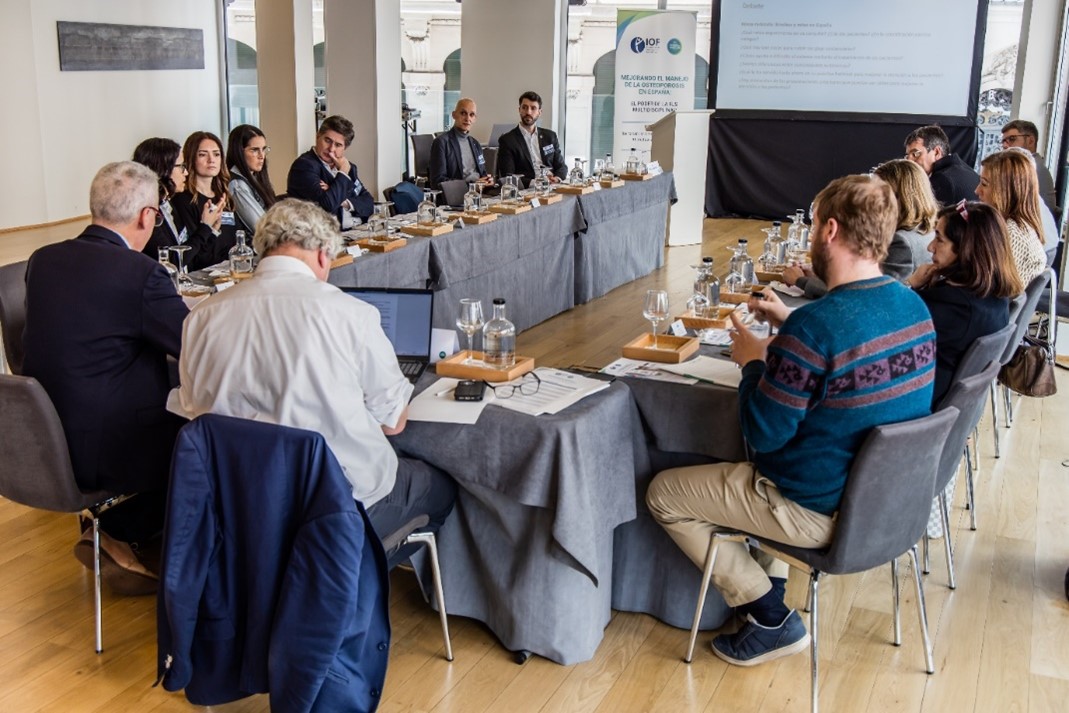Capture the Fracture welcomes 100th Spanish FLS to its network

Recognizing the commitment and success of the Capture the Fracture mentors in driving FLS development, effectiveness and sustainability
On January 20, 2025, Capture the Fracture® (CTF) celebrated a major milestone—welcoming the 100th Fracture Liaison Service (FLS) from Spain into its global network. This achievement highlights the growing recognition of the importance of secondary fracture prevention and comprehensive post-fracture care. Currently, the number of FLSs in Spain has increased to 105, demonstrating a continued strong commitment to tackling osteoporosis-related fractures in the country.
The Burden of Osteoporosis in Spain
Osteoporosis and fragility fractures pose a significant and increasing burden on Spain’s healthcare system. In 2019 alone, approximately 285,000 fragility fractures were recorded, contributing to an estimated economic cost of €4.3 billion. Without changes in policy or preventative care, fragility fractures are projected to rise by a third over the next 15 years.
Despite the availability of effective osteoporosis treatments, many high-risk individuals remain undiagnosed and untreated. More than 1.1 million Spanish women at high risk of fractures currently do not receive osteoporosis treatment. Alarmingly, two-thirds of women aged 50 and above who experience an initial fragility fracture do not receive adequate secondary fracture prevention. However, a recent study demonstrated that implementing an FLS protocol leads to increased anti-osteoporotic treatment, higher adherence, and improved survival rates among elderly fracture patients.
Addressing the Gaps: The Role of FLS
Despite the benefits of FLS in reducing secondary fractures, the SCOPE 2021 report found that in 2019 only 10% of Spanish hospitals had implemented this model. This under-provision represents a significant missed opportunity, given that individuals who have already experienced a fracture are at a much higher risk of subsequent fractures. Expanding access to FLSs across Spain is essential to addressing the growing osteoporosis burden and ensuring better patient outcomes.
Evidence-based, well-structured FLS can dramatically reduce fracture recurrence rates and related complications by guaranteeing prompt identification, evaluation, and treatment of patients with osteoporosis or fragility fractures. In addition to improving patients' quality of life, efficient FLS lowers hospital stays and long-term care requirements, which lowers costs.
The Mentorship Programme: Building Sustainable FLSs
To support the development and sustainability of FLSs in Spain, CTF launched a mentorship programme aimed at fostering leadership, knowledge-sharing, and quality improvement initiatives. The mentorship programme is led by four highly experienced experts dedicated to improving FLS services in Spain:
- Dr. Antonio Naranjo Hernández – Adjunct Physician in Rheumatology at the University Hospital of Gran Canaria Dr. Negrín
- Dr. Jesús Mora-Fernández – Geriatrics specialist at the Hospital Clínico San Carlos
- Dr. Enric Duaso – Hospital Universitario de Igualada
- Dr. José Manuel Cancio Trujillo – FLS Badalona Serveis Assistencials (BSA), Badalona, Barcelona
Since their certification, these mentors have been influential in enhancing the quality of FLS services across Spain. They have offered free expert advice through webinars, workshops, and FLS Cafés to support FLS teams in achieving their specific objectives and overcoming challenges. Their guidance helps FLSs improve key quality indicators, ensuring that more patients receive timely and effective care.
Dr. José Manuel Cancio Trujillo emphasised the need for high-quality FLS care, stating, "Ensuring that every FLS delivers high-quality, evidence-based care is critical to preventing unnecessary fractures. The mentorship programme has shown that with the right support, we can significantly improve patient outcomes and enhance the sustainability of FLS services across Spain."
Impact of the Mentorship Programme
The mentorship programme has played a crucial role in expanding Spain’s FLS network. When the initiative began in 2021, there were only 55 FLSs in the country. Today, that number has nearly doubled. Additionally, 11 FLS have resubmitted their Best Practice Framework questionnaire and achieved higher scores with guidance from the mentorship programme.

The workshops (shown above, in February 2024) have been particularly impactful, offering small expert groups the opportunity to collaborate, exchange best practices, and discuss challenges in a personalised setting. This interactive approach has proven highly effective in strengthening the sustainability of FLS models in Spain.
Dr. Jesús Mora-Fernández highlighted the importance of mentorship, stating: "Sharing best practices and mentoring emerging FLSs is essential to ensuring their long-term success. By fostering collaboration, we can equip FLS teams with the tools they need to provide the best possible care for fracture patients."
Future Goals for the Mentors
Looking ahead, the mentorship programme aims to continue driving quality improvement initiatives and raising awareness among healthcare professionals. Future efforts will focus on:
- Encouraging multidisciplinary collaboration – Emphasising the need for diverse healthcare professionals to work together in fracture prevention
- Establishing lead FLS coordinators – Ensuring that FLS teams have strong leadership to manage their workforce effectively
- Enhancing sustainability of FLS models – Providing ongoing training and resources to maintain high-quality care
By building on the momentum achieved so far, Capture the Fracture® and its dedicated mentors are committed to ensuring that every patient at risk of fragility fractures in Spain receives the care they need. The continued expansion and improvement of FLS services will be critical in addressing the growing osteoporosis burden and preventing avoidable fractures in the years to come.